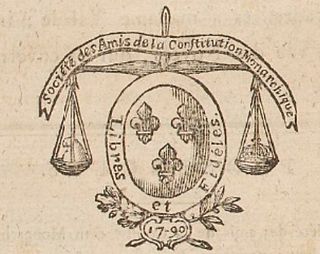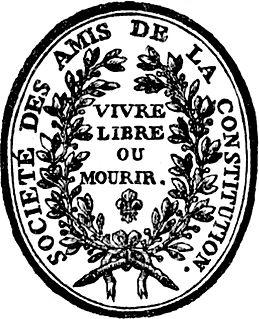This article needs additional citations for verification .(July 2019) |
| |||||
| Decades: | |||||
|---|---|---|---|---|---|
| See also: | Other events of 1790 History of France • Timeline • Years | ||||
Events from the year 1790 in France .
This article needs additional citations for verification .(July 2019) |
| |||||
| Decades: | |||||
|---|---|---|---|---|---|
| See also: | Other events of 1790 History of France • Timeline • Years | ||||
Events from the year 1790 in France .


Louis XVI was the last King of France before the fall of the monarchy during the French Revolution. He was referred to as Citizen Louis Capet during the four months just before he was executed by guillotine. He was the son of Louis, Dauphin of France, son and heir-apparent of King Louis XV, and Maria Josepha of Saxony. When his father died in 1765, he became the new Dauphin. Upon his grandfather's death on 10 May 1774, he assumed the title King of France and Navarre until 4 September 1791, when he received the title of King of the French until the monarchy was abolished on 21 September 1792.

The National Constituent Assembly was a constituent assembly formed from the National Assembly on 9 July 1789 during the first stages of the French Revolution. It dissolved on 30 September 1791 and was succeeded by the Legislative Assembly.

The following is a timeline of the French Revolution.

The Girondins, or Girondists, were members of a loosely knit political faction during the French Revolution. From 1791 to 1793, the Girondins were active in the Legislative Assembly and the National Convention. Together with the Montagnards, they initially were part of the Jacobin movement. They campaigned for the end of the monarchy, but then resisted the spiraling momentum of the Revolution, which caused a conflict with the more radical Montagnards. They dominated the movement until their fall in the insurrection of 31 May – 2 June 1793, which resulted in the domination of the Montagnards and the purge and eventual mass execution of the Girondins. This event is considered to mark the beginning of the Reign of Terror.

The Mountain was a political group during the French Revolution. Its members, called the Montagnards, sat on the highest benches in the National Convention.

Jean-Baptiste Robert Lindet was a French politician of the Revolutionary period. His brother, Robert Thomas Lindet, became a constitutional bishop and member of the National Convention. Although his role may not have been spectacular, Jean-Baptiste Lindet came to be the embodiment of the growing middle class that came to dominate French politics during the Revolution.

The Fête de la Fédération was a massive holiday festival held throughout France in 1790 in honour of the French Revolution. It is the precursor of the Bastille Day which is celebrated every year in France on 14 July, celebrating the Revolution itself, as well as National Unity.
The dechristianization of France during the French Revolution is a conventional description of the results of a number of separate policies conducted by various governments of France between the start of the French Revolution in 1789 and the Concordat of 1801, forming the basis of the later and less radical laïcité policies. The aim of the campaign between 1790 and 1794 ranged from the appropriation by the government of the great landed estates and the large amounts of money held by the Gallican Church to the termination of Christian religious practice and of the religion itself. There has been much scholarly debate over whether the movement was popularly motivated.

Jean-Baptiste Treilhard was an important French statesman of the revolutionary period. He passed through the troubled times of the Republic and Empire with great political savvy, playing a decisive role at important times.

The Friends of the Monarchist Constitution, commonly known as the Monarchist Club or the Monarchiens, were one of the revolutionary factions in the earliest stages of the French Revolution. The Monarchiens were briefly a centrist stabilising force criticized by the left-wing of the National Constituent Assembly, the spectators in the galleries and the patriotic press. Established in August 1789, the Monarchist Club was quickly swept away. Specifically, the brief movement developed when the Revolution was shifting away from the Ancien Régime during the Spring of 1789 and was defeated by the end of 1789. Subsequently, the term itself is usually derogatory.
Events from the year 1775 in France.
The year 1848 in France, like in other European countries, is mostly remembered as the year of a revolution that deposed king Louis Philippe and brought Napoleon III to power as president of the second republic.

The Society of the Friends of the Constitution, better known as Feuillants Club, was a political grouping that emerged during the French Revolution. It came into existence on 16 July 1791. The assembly split between the Feuillants on the right, who sought to preserve the position of the king and supported the proposed plan of the National Constituent Assembly for a constitutional monarchy; and the radical Jacobins on the left, who wished to press for a continuation of the overthrow of Louis XVI. It represented the last and most vigorous attempt of the moderate constitutional monarchists to steer the course of the revolution away from the radical Jacobins.
Events from the year 1800 in France.

The Constitutional Guard was a French royal guard formation which lasted a few months in 1792 as part of the Maison du Roi, being superseded by the National Guard. It existed in the period of the constitutional monarchy during the French Revolution.

The trial of Louis XVI—officially called "Citizen Louis Capet" since being dethroned—before the National Convention in December 1792 was a key event of the French Revolution. He was convicted of high treason and other crimes, resulting in his execution.
Events from the year 1786 in France.
Events from the year 1791 in France.
Events from the year 1792 in France.
In 1789 is made the Declaration of the Rights of Man and of the Citizen, set by France's National Constituent Assembly. In 1791, the enslaved Africans of Saint-Domingue began the Haitian Revolution, aimed at the overthrow of the colonial regime.